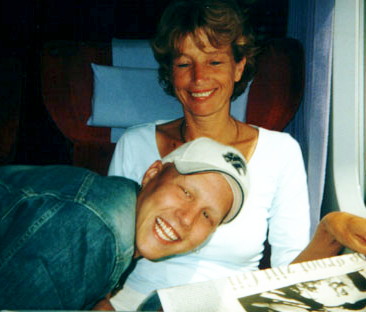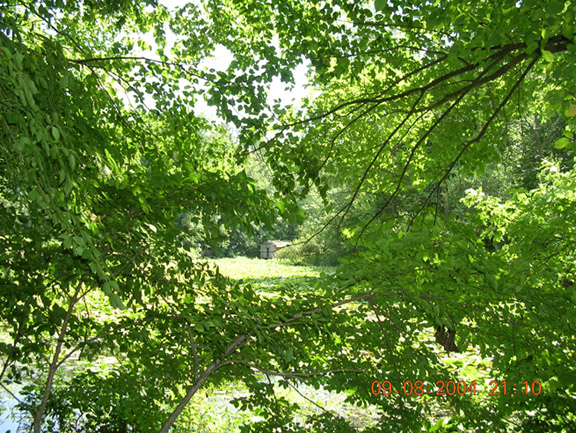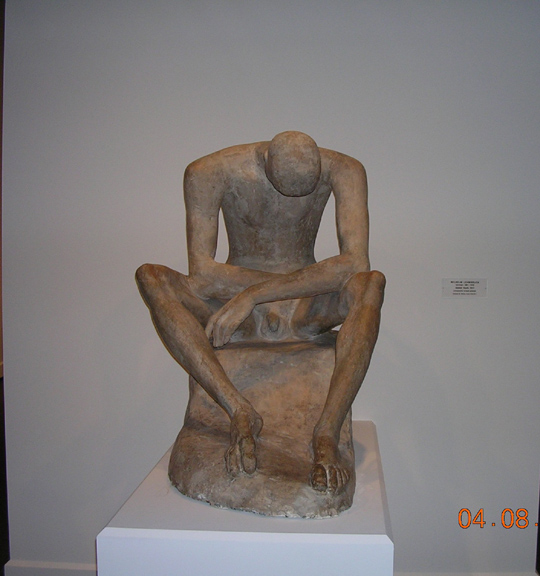ACOR: A Quest
 It was March 2002 when I joined ACOR's E-Sarcoma online support group. A month before, my son Paul Onvlee, born November 25 1984, had been diagnosed with Ewing's sarcoma. ACOR, unfortunately, could not change Paul's fate. He died May 15th, 2003. However, belonging to the support group did change my perspective on life, friendship, and loss, and that's what I want to tell you about.
It was March 2002 when I joined ACOR's E-Sarcoma online support group. A month before, my son Paul Onvlee, born November 25 1984, had been diagnosed with Ewing's sarcoma. ACOR, unfortunately, could not change Paul's fate. He died May 15th, 2003. However, belonging to the support group did change my perspective on life, friendship, and loss, and that's what I want to tell you about.
In late August 2004 I returned home in Holland from a 31-days trip around the world. I made this trip I for one purpose—to finally meet some of the women and men who had supported me, who had mailed me numerous times when I needed help, and who had chatted with me through the long sleepless nights before and after Paul was gone. Since there was no continent where we could all meet one another at the same time, I decided to visit all of them separately, traveling to Australia, Canada and the United States. When I told the E-Sarcoma list where I was going, many others agreed to meet me. One of them, Bruce Shriver, Liddy Shriver's dad, asked me to share some of my experiences with you. He did this while serving me a Brunello wine … so how could I refuse?
The E-Sarcoma List
All newcomers on list are confused, sad and afraid (just to mention some symptoms). Most of us are mothers or fathers of patients, some are partners and some are patients themselves. Some are just beginning treatment, others linger on, even after their child or partner has passed away. In the beginning, we want to learn everything about all possible treatments, we want to find comfort, immediate cures, and advice on how to cope with our grief. However, most of us, in our own way and pace, transform from 'takers' to 'givers'. Once some of our anxiety is smoothed by compassionate fellow travelers, we learn to listen to the need of our E-Sarcoma companions, learn to comfort others while we suffer ourselves, and learn to enjoy in the 'giving' more than the taking. We also share our anxieties, hidden so well in front of our loved ones at home. And we dare to laugh. In our own social environment, laughter often seems so unbecoming, so inappropriate. But on list we can unburden ourselves, we can relax our tensed muscles and minds, and we can focus on something else other than Ewing's and death for just a little while.
Sure there are many differences between us. What applies to any social surrounding, applies to the list as well. After a while "some become more equal than others." However, differences in religion, background, culture, education, attitude, etc. seem so much more irrelevant than in our real lives. The similarities matter more. "You can't control the situation, but you can control your attitude", was some of the best advice someone gave me. That's exactly what the list made me do. It made me more observant, made me realize I should try to enjoy Paul's company as long as he was with us, every single minute. Last but not least, the list showed me that parents can survive the death of a child. I admired girls like Rachel and Adele and many others, who miraculously had kept (or regained!) their sanity after the death of their child. If I can be such a "role model" for those who will one day lose their child then I'll just be what those moms were for me during Paul's last year.
Another blessing of modern times is instant messaging. One of the advantages of living in a different time zone, is that there is always someone to chat with, someone to share memories with. Especially the 'inner circle' of Ewing friends on instant messaging formed a bond I'd never thought people who never actually met one another, could share.
But ACOR brought me more. Whenever I read in the archives, where all our mails are stored, about Paul ("sweet Paul" as he was called on the list), it is as though he's still with me. In some of the mails I sent to the list during the period he struggled to overcome Ewing's, I managed to describe him so vividly, that my old mails evoke his presence even now. Memories I might have lost otherwise, remain with me. And the feedback on my mails about him makes me realize even more how special he was and is and will stay forever.
The Meetings
My trip lasted a month. I met some mothers and fathers of survivors. In Brisbane, Australia, I met "smotherly" Wendy, mother of 7-year survivor Sinclair (now 29), and Jen, mother of 2-year survivor Casey (20). In Carson, Virginia, I met Norma, mother of 3-year survivor Charlie (26), and in New York I met Glenn, dad of 4-year survivor Samantha (27). Sinclair and Charlie were the first survivors I saw 'for real'. Later I also met survivor Debby. I actually felt proud looking at them: they did it, they beat the monster Paul couldn't beat. Of course they're all still afraid fate might take a turn for the worse… but for the time being… we all rejoice in their relative health and happiness. A few weeks before he died, Paul told me, "Mom, the world would be a much better place if everyone got a disease like mine." He added, after some hesitation, "But then get better, of course!" Meeting those survivors and their families showed me how right he was. Virtual friends became real friends for life.
I also met other bereaved parents: Rachel and Steve, parents of Kyle, Adele, mom of Paul, Bruce and Beverly, parents of Liddy, Linda, mom of Jon, and Dawn, mom of Brian. Our children between 16 and 38 are all way too young to die. Our eyes may sometimes mirror Ground Zero—but sometimes there is joy in them as well. Imagine what it is like to drive 'downwards' with Rachel for 2 1/2 hours from Sault Sainte Marie in Canada to Gaylord in Michigan to meet Adele who had traveled 'upwards' from Grand Rapids for 3 1/2 hours. You should have seen us, sitting in a restaurant and talk and talk, go through lots of pictures of our three boys and laugh and cry at the same time, taking pride into all of them. Imagine what it is like to hold hands with a crying grandmother and to listen for hours to a dad who cries for his son he lost 3 years ago. How strange that sadness teaches us so much more about the human condition than gaiety. How nice to experience that being 'equal' in mourning makes it easy to trust strangers.
Then I met those one the list still fighting or fighting again: Kayce and her parents, Rachel and her mother Jodi, Shannon and her dad Jim. I recognized their fears and hopes. All I can do is hope their future will be brighter than Paul's. I can't diminish their pain, not a single one of the 65.000 kilometers I traveled to hold their hand will bring them more than momentary relief. All the people I met got an old Coptic or Ethiopian cross as a present. It was my pleasure to distribute this special collection between my Ewing-friends. May these small gifts protect each and every household forever!
I like to finish this section about my meetings with a quote from a book I read while I was in New York: "These were the lovely bones that had grown around my absence: the connections – sometimes tenuous, sometimes made at great cost, but often magnificent – that happened after I was gone. And I began to see things in a way that let me hold the world without me in it. The events my death wrought were merely the bones of a body that would become whole at some unpredictable time in the future. The price of what I came to see as this miraculous body that had been my life." ("murdered" Susie Salmon speaking in Alice Sebold, The lovely bones, Back Bay books, pg. 320.). I might say that those people I met, in one way or another connected to this horrible disease that took away Paul, were the 'lovely bones' that grew around his absence.
Landscapes, Art and Literature
 I did not just meet friends. I saw part of the world itself as well—impressive landscapes, buildings, old and new, and art. Wendy showed me Brisbane and its surroundings and drove me to Sydney. We saw Bellini's Norma in the opera house and admired the botanic garden. Rachel showed me part of Lake Superior and Lake Michigan, Norma showed me Washington, the Holocaust museum, Smithsonian Modern Art, the many war memorials. And in the end I met Glenn in New York and saw the Frick, Guggenheim, Whitley, Metropolitan, and Modigliani in the Jewish Museum. Dazzling! In between I spent many hours reading books and watching continents from plane's windows. I always hope Paul's soul travels with me in the clouds – so easily mistaken for mountains, lakes and homes. Sometimes it's the world itself that makes me hope Paul has found himself a nice place. What about this shed Bruce and Beverly showed me at Teatown Lake in Ossining for example, doesn't it look like heaven on earth?
I did not just meet friends. I saw part of the world itself as well—impressive landscapes, buildings, old and new, and art. Wendy showed me Brisbane and its surroundings and drove me to Sydney. We saw Bellini's Norma in the opera house and admired the botanic garden. Rachel showed me part of Lake Superior and Lake Michigan, Norma showed me Washington, the Holocaust museum, Smithsonian Modern Art, the many war memorials. And in the end I met Glenn in New York and saw the Frick, Guggenheim, Whitley, Metropolitan, and Modigliani in the Jewish Museum. Dazzling! In between I spent many hours reading books and watching continents from plane's windows. I always hope Paul's soul travels with me in the clouds – so easily mistaken for mountains, lakes and homes. Sometimes it's the world itself that makes me hope Paul has found himself a nice place. What about this shed Bruce and Beverly showed me at Teatown Lake in Ossining for example, doesn't it look like heaven on earth?
In the plane between St. Francisco and Toronto I read the following paragraph from one of my favorite authors, Alain de Botton, "If the world is unfair or beyond our understanding, sublime places suggest it is not surprising things should be thus. We are the playthings of the forces that laid out the oceans and chiseled the mountains. Sublime places gently move us to acknowledge limitations we might otherwise encounter with anxiety or anger in the ordinary flow of events. It is not just nature that defies us. Human life is as overwhelming, but it is the vast spaces of nature that provide us with the finest, the most respectful reminder of all that exceeds us. If we spend time in them, they may help us to accept more graciously the great unfathomable events that molest our lives and inevitably return us to dust." (Alain de Botton, The art of Travel, Penguin Books, pg. 178-179). If this travel was meant to bring me some comfort, to find some peace with Paul's short life… then the landscapes I saw and these words added to it.
If this travel was meant to bring me some comfort, to find some peace with Paul's short life… then the landscapes I saw and these words added to it.
Speaking about meetings, in the Smithsonian Museum of modern art in Washington I met Paul again through this 'young man' from Picasso (to the left).
Picasso managed to catch Paul's long, fragile body in a compelling resemblance. And Brancusi (Guggenheim) showed me another glimpse of his face, turned to stone (to the right).
 Was it fate that made me read these lines a week before in Canada? "As I'm never going to be old, I'm glad that I never lost my sense of wonder about the world, although I have a hunch it would have happened pretty soon. I loved the world, its beauty and bigness as well as its smallness (…) The world is a glorious place, and filled with so many unexpected moments that I'd get lumps in my throat (…)" ("murdered" Cheryl Anway speaking in David Coupland's Hey Nostradamus!, Vintage Canada, pg. 10).
Was it fate that made me read these lines a week before in Canada? "As I'm never going to be old, I'm glad that I never lost my sense of wonder about the world, although I have a hunch it would have happened pretty soon. I loved the world, its beauty and bigness as well as its smallness (…) The world is a glorious place, and filled with so many unexpected moments that I'd get lumps in my throat (…)" ("murdered" Cheryl Anway speaking in David Coupland's Hey Nostradamus!, Vintage Canada, pg. 10).
These "meetings" with art caused lumps in my throat. Nature, art and literature seem to underline the transience of life, an impermanence I'm more aware of than I used to be.
Back Home
Back at home I went to Paul's grave. No, I'm not the type of mom to sit there and tell him about my trip. If he is around somewhere, he knows my whereabouts anyway. We planted 'vinca minor' on his grave, mainly because of its Dutch name: maagdenpalm ('palm of virgins'). Being covered by a blanket of maagdenpalm fits him so well. Only last week did I find out that they extract vincoblastin from it, a cytostatic for many forms of cancer. That makes our choice even more befitting.
My journey was a quest. I didn't find the grail, instead I found true friendship. "The only stories we could tell now, were the ones we already had", Jonathan Franzen remarks, after losing his dad (How to be alone, Picador, pg.38). In a way that's true about Paul as well. Still, during my trip I told many new stories about him, my eternal traveling companion. And my trip provided me with many new stories to tell for a long time afterwards. Places like the ACOR-list provide us friends to share them with. That's truly a blessing in these dark times.
We will grieve not, rather find
Strength in what remains behind.
(Wordsworth, Ode: Intimations of Immortality, X)
Sites
If you want to read or see more about Paul, you can visit www.paulonvlee.net. Under 'biografie' you'll find an English version. You can also sign the guestbook (gastenboek).
V1N6 ESUN Copyright © 2004 Liddy Shriver Sarcoma Initiative.
